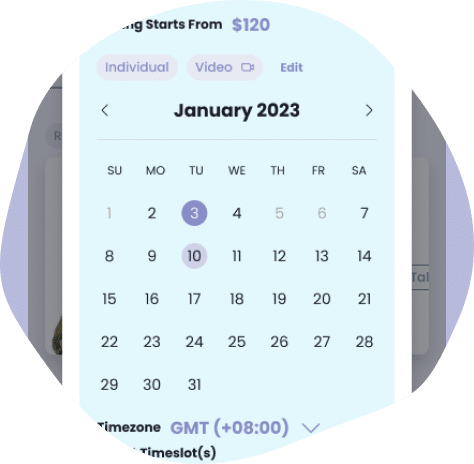Heal, Cope, and Thrive With Online Therapy
Talk Your Heart Out… we are here to listen.





How It Works
Access mental health services anytime, including after work hours and on weekends.
01
Choose Your Therapist


02
Book a session
Select the service type, medium, and date to view the availability of a Therapist.
03
Attend Your Online Therapy
Attend virtual sessions (video or audio) and manage your booking – all via our website.

TYHO: Setting the Standard for
Quality Therapy
Unparalleled Expertise. Personalised Care. Seamless Experience
Unparalleled Expertise
We carefully handpick professionals who have a proven track record.
Advanced Online Platform
Our intuitive and user-friendly platform makes online counselling convenient and seamless.
Comprehensive Service Range
Whether you're seeking therapy for anxiety, depression or relationships, TYHO has you covered.
Personalised Approach
Our therapists take the time to understand your specific needs, concerns and goals.
Flexible Scheduling
Fit us in your routine: morning, evening, or weekend sessions available.
Commitment to Privacy and Confidentiality
We ensure that your personal information and sessions remain completely secure and private.
88%
Find quality of services to be our defining feature
96%
Find our platform
convenient to use
95%
Of our clients would recommend TYHO
50,000+
Community
members
What Therapy Can Help You With
And Why Us
Increased Self-esteem
Do you lack confidence in yourself or what you do, feel incompetent or unappreciated? We can help reduce your negative self-talk and increase your self-compassion and self-worth.
88% find quality of services to be our defining feature
Everyone deserves accessible and affordable online therapy. Hence, TYHO Therapists prioritise providing high-quality care to their clients.
Depression
Do you feel persistent feelings of sadness, hopelessness and experience a lack of joy in activities you once enjoyed? TYHO Therapists can teach you tools to identify and manage unhelpful emotions.
96% find our platform easy to use
You can easily book appointments and communicate with your Therapist on our platform. TYHO makes your therapy experience as stress-free as possible.
Anxiety
Do you feel easily fatigued, have racing thoughts, and feel overwhelmed with daily tasks? Our psychologists in Malaysia provide relaxation and mindfulness strategies to help you cope with anxiety.
Only 10% Therapist acceptance rate
Quality is our promise. We curate our Therapists based on high standards and only select the best and most qualified professionals.
Relationship Issues
Do you and your partner fight or argue a lot and can’t tell what the other is thinking or feeling? Try couples counselling at TYHO to learn how to communicate effectively and handle conflicts in relationships.
Stress
Do you frequently have muscle aches, chest pains, indigestion, and anger outbursts? You might be stressed. TYHO counsellors can help you with stress management strategies to improve the overall quality of your life.
98% of our clients would recommend TYHO
TYHO clients find our services affordable and accessible and would recommend us to anyone seeking mental health support.
Burnout
Are you struggling with a lack of motivation, interest, or productivity at work? Therapists at TYHO can help you understand burnout and provide you with coping methods to heal from over-exhaustion.
Self-Awareness & Growth
Do you want to take control of your life decisions? Therapy can help you understand yourself better and gain insights into your thoughts and actions.
5-Star Reviews
TYHO clients regularly give our platform and our Therapists positive reviews on trusted platforms like Google Reviews and Trustpilot.
Anger Management
Are you struggling to control your anger or aggression when you feel upset? You can learn how to manage your emotions through therapy.
Online Therapists Anywhere and Everywhere
Finding the right Mental Health Counsellor
At TYHO, we understand finding a reliable and trustworthy professional counsellor or clinical psychologist can be a daunting task. We are here to make it easy for you to find exceptional Therapists no matter where you live. We have carefully curated a pool of online counsellors who are highly qualified, experienced, and professional – so you don’t have to.
What to expect at TYHO
All our online Therapists at TYHO are qualified with a minimum of a Master’s degree. They also undergo professional training and are aligned with TYHO values. These include being empathetic, non-judgmental, and sensitive to diverse backgrounds and viewpoints. We guarantee that our Therapists are dedicated to providing their clients with the best care possible.
What Our Clients Say
Articles And Resources
Understanding Employee Assistance Programs in Singapore (And Why Your Company Needs One)
A Therapist’s Guide to Setting Boundaries with Parents
Anger Management in Singapore: Top 6 Benefits
Subscribe to Our Newsletter
Interested in joining our newsletter and stay connected? Drop your email address below!
Mental health news and tips delivered to your inbox monthly
Frequently Asked Questions
Online counselling is a form of therapy in which you connect with a licensed therapist via audio or video sessions to improve your life or heal relationships.
You can explore personal, work-related, or family issues during online counselling.
Some common reasons people seek therapy include depression, anxiety, stress, burnout, intergenerational trauma, and more.
Note: While there’s no fixed list of what you can or can’t talk about, online counselling might not be suitable in certain situations. For example, if you’re going through a crisis or are at immediate risk of harm to yourself or others, in-person support from a clinical psychologist or psychiatrist may be more appropriate.
At TYHO, every session is 60 minutes long.
The duration of therapy applies to all types of therapy services (individual, couples, family) and the mode of counselling (online and in-person).
At TYHO, individual counselling sessions start at US $95. Each session includes a personalised therapeutic plan, access to free mental health resources, and high-quality therapy.
Prices may vary slightly depending on the type of session or any available discount packages. Couples counselling is available for an additional $15.
For more details on pricing, please visit the link below.
People seek counselling for various reasons, and any reason is valid. Here are some common signs that may indicate it’s time to consider counselling:
- Persistent low mood or mood swings
- Loss of interest in activities you used to enjoy
- Difficulty maintaining relationships
- Overeating or avoiding food
- Sleeping too much or struggling to sleep
If you relate to two or more of these signs, online counselling could be helpful. However, you don’t have to wait for things to get worse before seeking therapy.
Just as you would see a doctor for the flu to prevent it from getting worse, early therapy can help prevent low moods from leading to depression or anxiety.
Click the link below to learn more about the signs that you may need therapy.
You can book a session with TYHO at least 2 hours in advance.
To book, simply visit a Therapist’s profile, click the ‘Book a Session’ button, and view their availability. You can choose the type of service (individual, couples, family), the medium, and the date. Prices will be shown once all options are selected.
After choosing, click ‘Pay & Confirm’ to complete the payment. You can create an account to manage your bookings.
If you need help selecting a Therapist, please email us at [email protected] or reach out to us on WhatsApp (see icon below).




